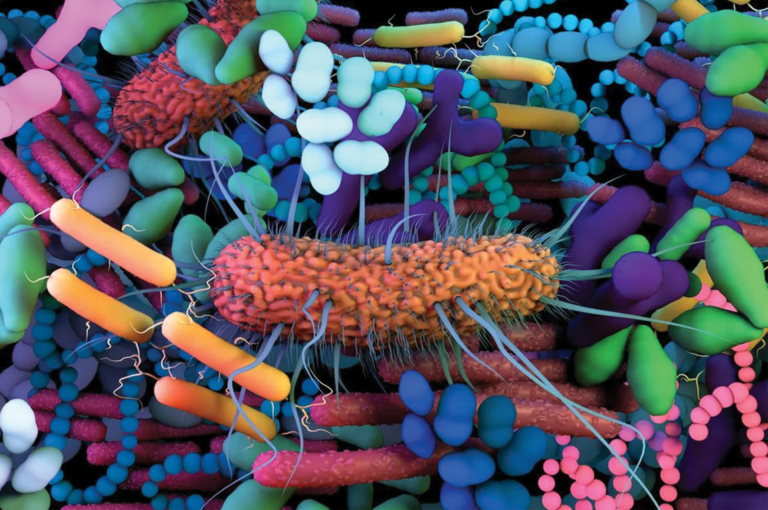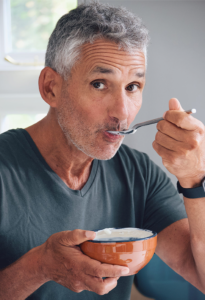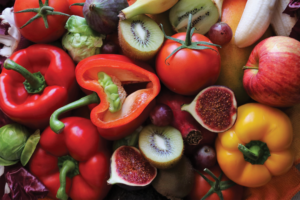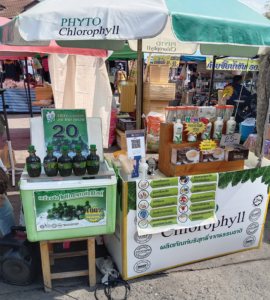Why is Everyone talking about The Microbiome right now?

The Microbiome refers to the collection of trillions of microorganisms: (bacteria, viruses, and fungi) that inhabit our guts. These microorganisms play a crucial role in maintaining our health by aiding digestion, synthesising vitamins, and helping the immune system. An imbalance in one’s microbiome can lead to inflammatory bowel disease, obesity, diabetes, and even mental health conditions such as depression and anxiety. Recent research tells us that it’s a subject well worth looking into and currently, Netflix has been doing just that with their programme “Hack your Health: The Secrets of Your Gut”. It makes for easy viewing, clearly explaining the biology and including case studies of people with extreme imbalances in their microbiome. The programme features Professor Tim Spector, a prominent epidemiologist and geneticist who is everywhere in London at the moment. Known originally for the TwinsUK registry (one of the world’s most comprehensive studies aimed at understanding how genetic or environmental influences affect us – Nature or Nurture). He shifted focus to studying the microbiome after some personal health problems, writing several influential books, including “The Diet Myth” and “Spoon-Fed,”.

Having become a rather popular food guru, Tim Spector went on to be co-founder of the Zoe diet which is extremely popular in the UK right now. The diet focuses on understanding every individual’s response to food by analysing gut microbiome, blood sugar, and blood fat levels through advanced testing. After testing a personalised programme is provided with dietary recommendations. It costs quite a bit and of course, comes with an App. During a recent trip to the UK, I met up with a friend who has bought into it. She is generally happy with the system but has lapses. Certainly, I know I wouldn’t be able to keep up with the amount of calculating and entering of data re different food groups, that she seems to have to do on a daily basis. However, much of what Tim Spector and Netflix are putting out there does make logical sense to me. For years we have regarded the very word “bacteria” as bad, and as kids, lived in a clean, disinfected world. I remember Grandparents shaking their heads, saying: “It’s good for children to get dirty once in a while”. What the “Hack you Health” episode tells us is that we have destroyed much of the healthy bacteria that should naturally occur in our Microbiome helping us to digest food and maintain good health. It’s not just a lack of getting dirty though, other factors can adversely affe ct the microbiome including the taking of too many antibiotics, and of course poor diet especially with over-processed foods.

Each of us has a unique Microbiome based on our genetics and lifestyle to date. We’ve been hoodwinked by misconceptions such as “listening to what our body wants” whereas recent research has shown that our cravings have mostly been formed by bad habits. “If you eat a lot of sugar, you get sugar-loving bugs. If you eat a lot of fat, you get a lot of fat-loving bugs,” explains microbial ecologist Jack Gilbert. It is important to introduce a diversity of foods into children’s diets so that they can build a healthy Microbiome and be less prone to developing food allergies. Taking steps to improve our gut health is good not just for our physical well-being but also for our mental health. Gilbert and his team discovered that people with certain depression-like symptoms were missing bacteria in their gut that produce chemicals which shape brain chemistry. In a study utilising mice, they found that those given microbes from a healthy person were generally more explorative and inquisitive but mice that were given microbes from a depressed individual developed stress, anxiety and depression. These mice also experienced changes in the chemicals involved in serotonin (the body’s natural “feel good” chemical) both in their gut and brain. Further research has shown that an unhealthy gut can even lead to autoimmune disorders and Parkinson’s disease.

However, the good news is that we can reverse some of the damage already done. It turns out that our gut can be extremely flexible and can react favourably if we seriously change the way we eat. Diets rich in fibre and fermented foods can promote a healthy microbiome, as can the addition of probiotics. Most importantly of all, to promote overall well-being it is essential to consider a complete lifestyle change rather than just a temporary diet fix. Doctors speaking during the Netflix programme advise the counting of plants, encouraging us to consume 20-30 per week. For me, counting never seems to work but what I have found myself doing recently is considering my choices when looking at menus or deciding what to eat on a daily basis. If you can’t do the 5 a day trick at least make sure to include fruit and veg with your meals. Or consider juices and smoothies with as much variety and different colours as possible. You might even visit the lady at the Rompho market in Jomtien who has a stand selling chlorophyll water – she’s been there for years so must be doing something right and after all any improvement is a good improvement! Bon Appetit!
